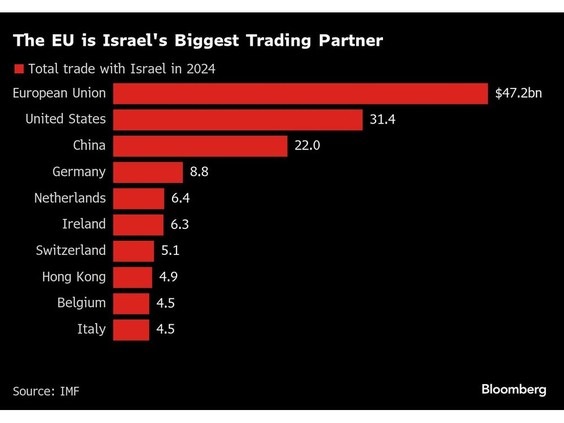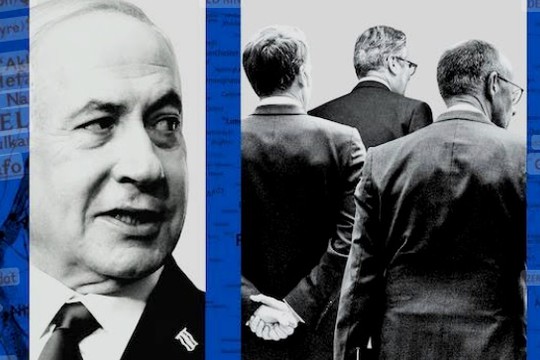European leaders are turning their backs on Netanyahu.
Photo: ‘The Telegraph’
Some of Israel’s most loyal supporters in Europe are increasingly speaking out against the war in Gaza, with several nations, including Germany, considering trade sanctions and curbs on arms sales, Bloomberg notes.
In recent weeks, the UK, Netherlands and France have started mulling such moves against Israel to help end the 20-month conflict, which has destroyed much of Gaza and sparked what international aid agencies say is a hunger crisis. Germany’s pivot was the most surprising due to its historical position that protecting Israel is a post-Holocaust obligation.
German anger with Prime Minister Benjamin Netanyahu’s government grew when it intensified military operations against Hamas in mid-May and continued blocking aid to Gaza, according to information obtained by Bloomberg. In the German government’s first such comments since the start of the war, Chancellor Friedrich Merz said the humanitarian situation could “no longer be justified by a fight against Hamas terrorism.”
The condemnation is symbolic of the shift in Europe and of Israel’s increasing isolation.
Opinion polls show growing discontent. In a survey last week by Civey for Germany’s Tagesspiegel newspaper, more than half the respondents said it was wrong for Berlin to export weapons to Israel.
The sentiment is similar in several other nations and protests have escalated. Last month, the Netherlands saw one of its biggest protests in years, with tens of thousands of people calling for the war to stop.
“It’s simply become impossible for most European governments to continue supporting Israel’s war despite strong ongoing commitments to Israel’s security,” said Julien Barnes-Dacey, program director for the Middle East and North Africa at the European Council on Foreign Relations.
More countries are taking action and calling for the European Union to adopt sanctions on Israel. The EU’s foreign policy chief, Kaja Kallas, in May said there is “a strong majority” in favor of reviewing the bloc’s trade agreement with Israel. Merz subsequently said Germany — one of Israel’s main arms suppliers — is considering restrictions on military exports.
The EU is Israel’s largest trading partner, with the two exchanging $47 billion of goods last year, according to the International Monetary Fund, and a change in policy would have a palpable impact on the Jewish state’s economy, which is under strain because of the war.

The UK announced plans to pause free-trade talks with Israel and sanctions against a handful of individuals and entities it said were engaged in violence against Palestinians in the West Bank.
Still, European governments remain supportive of Israel’s right to defend itself and EU sanctions would likely face opposition from the likes of Hungary. In addition, any measures to cut weapons exports could hurt European defense companies, while risking reciprocal action from Israel, which sells air-defense and other military equipment to Europe.
Images of hungry and injured children and a territory reduced to rubble have spread across news bulletins and social media, intensifying protests and prompting more pressure on Israel to increase aid supplies and stop its bombardment. On Friday, French President Emmanuel Macron said that Europe will have to harden its collective stance toward Israel unless the situation in Gaza improves soon.
“The level of human suffering in Gaza is intolerable,” France said in a joint statement with the UK and Canada on May 19. “We will not stand by while the Netanyahu Government pursues these egregious actions.”
For now, Israel’s most important ally, the US, is standing by Netanyahu’s government. Still, President Donald Trump has consistently spoken of wanting to stabilize the Middle East and has said he wants the conflict in Gaza to end.
Netanyahu has lashed out at Macron and UK Prime Minister Keir Starmer, accusing them of “inviting more such atrocities” on Israel.
read more in our Telegram-channel https://t.me/The_International_Affairs

 12:29 05.06.2025 •
12:29 05.06.2025 •























